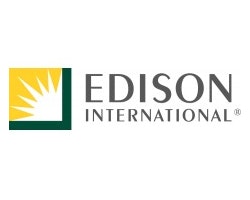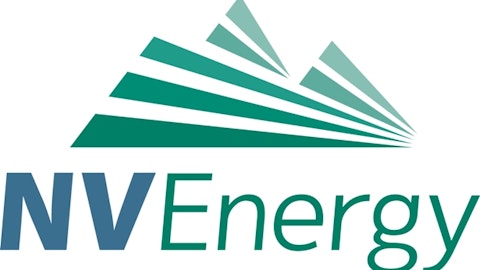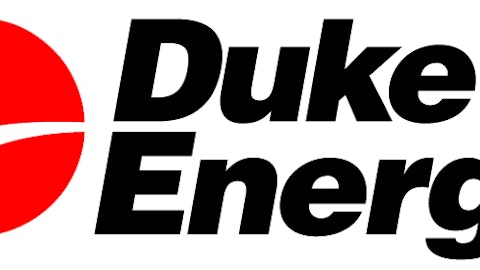In the long-running debate over energy policy, there remains an assumption that businesses and investors prefer the stability of nuclear power over the intermittent vagaries of solar or wind power.
That may be changing, and utility investors need to consider that.
Edison International (NYSE:EIX)‘s decision to close the San Onofre nuclear plant, and lay off about 1,000 people, was actually met with a sigh of relief by investors, who boosted the shares almost 2%. This put the company’s gain for the year ahead of that of Georgia’s The Southern Company (NYSE:SO), which has doubled down on nuclear power with two plants on the Savannah River.
Edison goes nuke-less
Analysts have yet to catch on to this investment trend. Jefferies re-iterated its “underperform” rating on Edison as recently as June 4.
But numbers don’t lie. Edison International (NYSE:EIX) has been a steady money-maker, raising its year-to-year revenue for the March quarter by roughly 10%, and bringing more than twice as much of that to the bottom line as before. The balance sheet will take a hit if large investments in San Onofre are written-off, but that’s a financial event more than a business event.
Southern California Edison International (NYSE:EIX), the company’s main subsidiary, draws more of its power portfolio from renewable sources than any other utility in the country. This is mainly because, being in California, it has access to substantial geothermal assets other companies can’t get to. Of the over 15,000 Gigawatt hours delivered to the company from renewable sources in 2012, solar represented just 7%. Wind power comprised 41% of the portfolio last year, and geothermal slightly more.
This should change soon. Southern California is a hotbed for both large-scale and rooftop solar systems. The cost per-watt of solar is now below the per-watt cost of other forms of grid energy. Better yet, wind power peaks at night and on cloudy days, while solar power peaks during the late afternoon, when demand from air conditioning reaches a peak. This means the company may not have to add a lot of energy storage to its grid in order to take more solar power.
Southern still likes nukes
The Southern Company (NYSE:SO) is more closely tied to nuclear power than any other U.S. utility. It draws power from three nuclear facilities in Georgia, Alabama and South Carolina, and has begun active construction of two new plants in Georgia, employing about 1,500 people by next year.
The Southern Company (NYSE:SO) originally went toward nuclear in order to reduce its reliance on coal, but last year’s drop in natural gas prices led to a major shift. Coal’s contribution was cut in half, to 35%, and the company has begun considering the closure of some coal-fired plants, while it has become the second-largest consumer of natural gas in the country.
CEO Tom Fanning insists that renewable energy is not yet price-competitive in his region, but the company does have an active renewable program emphasizing biomass and landfill gas.
For the first quarter of 2013 The Southern Company (NYSE:SO) performed about as well as energy, increasing revenue by about 10% year-to-year. But it was only able to bring $97 million to the bottom line, less than one-quarter of what it brought in the same period a year ago, as the growing nuclear construction cost started to bite. The balance sheet shows about $1 billion more in long-term debt than a year ago, and half as much cash. By the end of March the company had nearly exhausted its cash reserves, and is cash flow negative.
Despite all this the company continues to pay a healthy dividend of $0.51 per share, a yield of 4.58%. This compares with a $0.34 per share dividend, yielding 2.85%, for Edison International (NYSE:EIX). Still, if Southern is pulling other money from the sofa cushions to pay off shareholders, while Edison is able to fund the dividend from operations, as it is, which yield is safer?
My Foolish take
There is an assumption in the business press that utilities with a high mix of renewable energy, especially solar energy, are more vulnerable than those which rely on more “stable” forms of energy like nuclear power.
It’s hard to challenge such assumptions. But you can profit from them, if you see investment and financial trends moving the other way. Edison International (NYSE:EIX), which is closing a nuclear plant, is becoming a better long-term bet than the company that is building new ones.
The article Are Investors Saying No to Nukes? originally appeared on Fool.com and is written by Dana Blankenhorn.
Dana Blankenhorn has no position in any stocks mentioned. The Motley Fool recommends Southern Company. Dana is a member of The Motley Fool Blog Network — entries represent the personal opinion of the blogger and are not formally edited.
Copyright © 1995 – 2013 The Motley Fool, LLC. All rights reserved. The Motley Fool has a disclosure policy.



